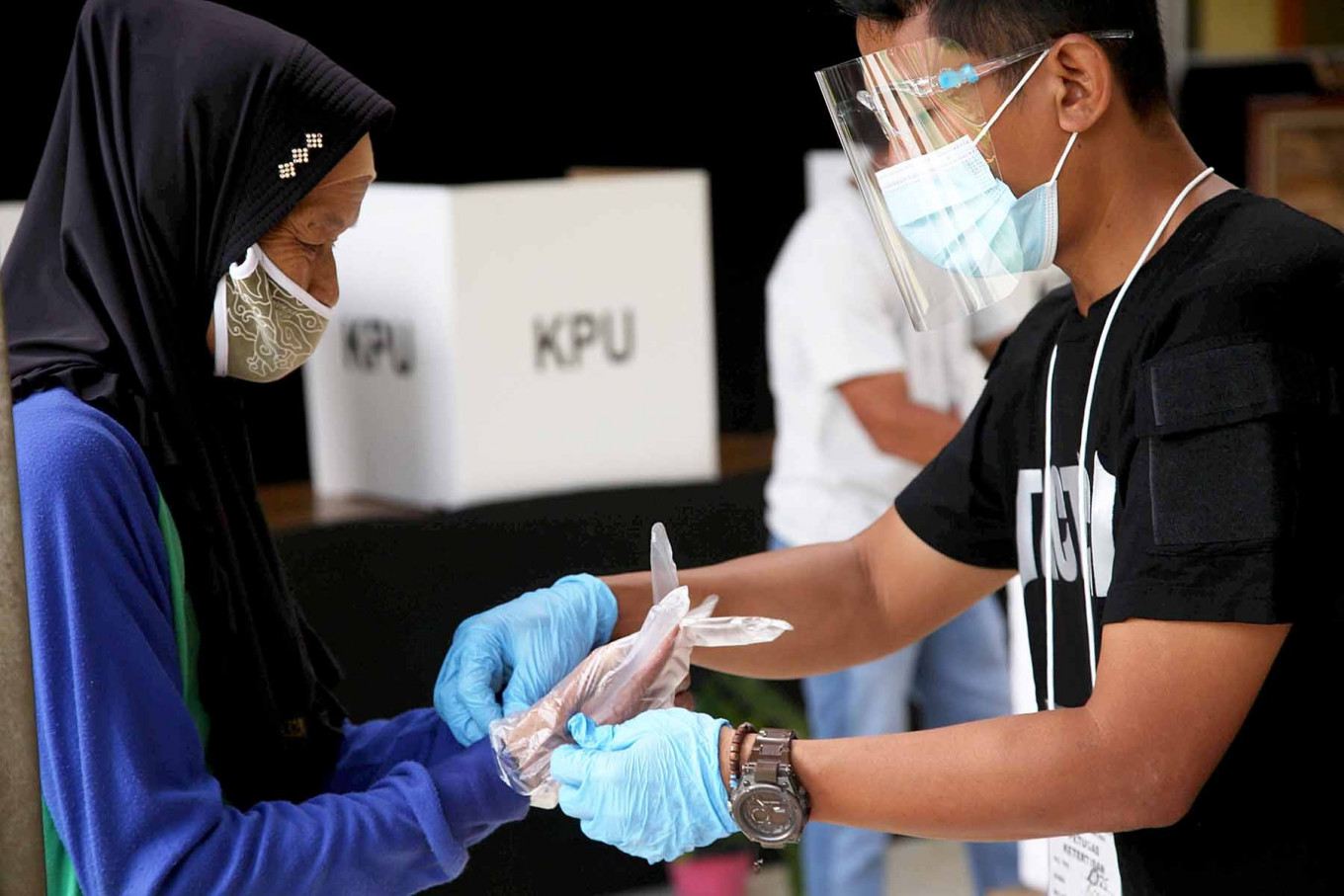Popular Reads
Top Results
Can't find what you're looking for?
View all search resultsPopular Reads
Top Results
Can't find what you're looking for?
View all search resultsLeaders without mandates
For a year or two the government will take over the control of the regions through acting governors, mayors and regents, who will be appointed to avoid a power vacuum.
Change text size
Gift Premium Articles
to Anyone
 A poll worker (right) helps a woman put on a plastic glove before she casts her ballot at a polling station in Tapos, Depok, West Java, on Dec. 9, 2020. Poll workers enforced strict health protocols on voting day for the Depok mayoral election, requiring voters to wear gloves and face masks, among other precautions. JP/P.J. Leo (JP/P.J. Leo)
A poll worker (right) helps a woman put on a plastic glove before she casts her ballot at a polling station in Tapos, Depok, West Java, on Dec. 9, 2020. Poll workers enforced strict health protocols on voting day for the Depok mayoral election, requiring voters to wear gloves and face masks, among other precautions. JP/P.J. Leo (JP/P.J. Leo)
N
ot only will voters miss the excitement of local elections after both the executive and legislative powers agreed not to hold direct elections for regional heads in 2022 and 2023. But more worryingly, democracy at the local level will suffer as the government will handpick governors, mayors and regents to lead the regions until the next elections scheduled for November 2024.
The agreement has ended debate over whether the 2017 Elections Law and 2016 Regional Elections Law needed revision.
For a year or two the government will take over the control of the regions through acting governors, mayors and regents, who will be appointed to avoid a power vacuum. For many the practice is reminiscent of the New Order’s centralized regime, in which Jakarta could veto the outcome of elections by the regional legislative councils. In most cases, the central government had already named its choices – usually military officers especially for Java – prior to the regional legislatures formalizing their appointment in the elections.
Such a sense of déjà vu is awaiting people in 272 regencies, mayoralties and provinces, who will miss the five-yearly political cycle. In Jakarta and in 100 other regions, the absence of a definitive leader will last two years, which is too long to bear in an era of regional autonomy.
Given the crucial role of regional leaders, who because of regional autonomy have taken over certain powers from the central government except with regard to fiscal, defense, foreign and religious affairs, they need strong support from the people to effectively govern, which was why direct elections were introduced in 2005.
In the absence of a popular mandate acting regional heads will be unable to feel they have earned their powers. They will be appointed only to carry out the routine jobs regional leaders cannot perform, but in the past there were attempts by some acting regional heads to breach the rules. A process of trial and error took place because of a basic lack of clarity in the national legal regime concerning regional government.
In 2017, a local government official sued the acting governor or Gorontalo for replacing him. The State Administrative Court ruled in favor of the official, saying the acting governor only had the right to appoint, but not to dismiss officials. A similar “abuse of power” happened in Biak in 2018 when the acting regent fired the director of a regional hospital, but the court found the decision was illegitimate.
There is no guarantee such abuses of power will not recur when acting regional heads fill their seats in 2022 and 2023, although the home minister will select them in a transparent and prudent manner. In the past the selection process took place behind closed doors, with only the president and the home minister knowing who would get what.
Judging from the political motivation behind the decision to snub regional elections in 2022 and 2023, the selection of acting regional heads will most likely support the ruling coalition’s agenda in 2024, when people will vote for the president, vice president and members of national legislatures for the 2024-2029 term.
Quoting Administrative Reforms Minister Tjahjo Kumolo of the ruling Indonesian Democratic Party of Struggle (PDI-P), the planned local elections in 2022 and 2023 were dropped as a result of “political calculations,” but clearly the people’s democratic rights were not taken into calculation.









